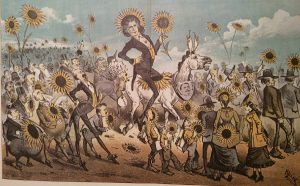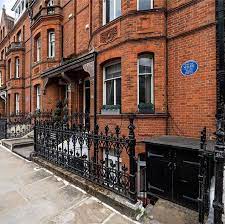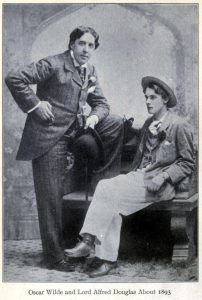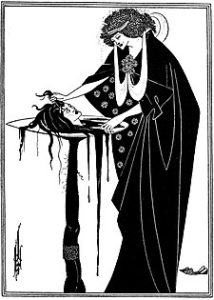For the first Virtual Tour of the season, we were taken by our excellent guide, Simon Whitehouse, on a journey through the life of Oscar Wilde: Writer, Wit and First Modern celebrity.
 Born in Dublin on 16th October 1854 to eccentric parents – Dr William Wilde, an ear, eye and throat specialist to Queen Victoria, and Jane Speranza Wilde, a published poet and nationalist, Oscar grew up being encouraged to sit and listen to the conversations at his mother’s very popular soirees. He was extremely bright, first attending Trinity College Dublin and then Oxford where he was influenced by the likes of Walter Pater and John Ruskin. He gained a double first in Classics and decided he was going to become ‘a poet, a dramatist, famous and notorious’.
Born in Dublin on 16th October 1854 to eccentric parents – Dr William Wilde, an ear, eye and throat specialist to Queen Victoria, and Jane Speranza Wilde, a published poet and nationalist, Oscar grew up being encouraged to sit and listen to the conversations at his mother’s very popular soirees. He was extremely bright, first attending Trinity College Dublin and then Oxford where he was influenced by the likes of Walter Pater and John Ruskin. He gained a double first in Classics and decided he was going to become ‘a poet, a dramatist, famous and notorious’.

Oscar mixed with many influential people. He became a good friend of Lily Langtree who, as mistress to Bertie the Prince of Wales, was able to introduce him to a new circle of friends. Representing the aesthetic movement he become famous for the flamboyant way in which he dressed.
Oscar self-published his first set of poems in 1881. These weren’t well received but he was undeterred by the negative publicity considering that any publicity was worthwhile. The Gilbert and Sullivan opera ‘Patience’, which opened at the Savoy theatre, is a satire of the aesthetic movement and it satirised Oscar but he didn’t mind and embraced the attention it gave him. His fame rose to such an extent that the Prince of Wales said ‘Not to be known by Oscar Wilde is not to be known’.
 In 1881 Oscar went to New York and was supposedly asked if he had anything to declare? His reply is said to have been ‘Nothing but my genius’. He stayed in New York for a year and gave 170 lectures which made him a massive amount of money. The title of the lecture was “The Renaissance of Art’ which he later changed to ‘The Decorative Arts’. When he returned to England he gave lectures on ‘How to decorate you house in the aesthetic arts’ and became very influential.
In 1881 Oscar went to New York and was supposedly asked if he had anything to declare? His reply is said to have been ‘Nothing but my genius’. He stayed in New York for a year and gave 170 lectures which made him a massive amount of money. The title of the lecture was “The Renaissance of Art’ which he later changed to ‘The Decorative Arts’. When he returned to England he gave lectures on ‘How to decorate you house in the aesthetic arts’ and became very influential.
 In May 1884 he married Constance Lloyd with whom he had fallen in love. She was beautiful, bright and artistic. They lived in Tite Street, Chelsea, with the likes of John Singer Sergeant and Whistler living down the road. Oscar and Constance had two sons and he wrote stories for them including ‘The Happy Prince’ and ‘The Selfish Giant’. During this time he became a journalist and edited the magazine ‘The Woman’s World’.
In May 1884 he married Constance Lloyd with whom he had fallen in love. She was beautiful, bright and artistic. They lived in Tite Street, Chelsea, with the likes of John Singer Sergeant and Whistler living down the road. Oscar and Constance had two sons and he wrote stories for them including ‘The Happy Prince’ and ‘The Selfish Giant’. During this time he became a journalist and edited the magazine ‘The Woman’s World’.
In 1886, when he was 32 two years old, he met 17 year Robbie Ross, a gay man who set out to seduce Oscar and then introduced him to other gay men.
In 1899 Oscar was commissioned by JM Stoddart to write a story and he wrote his only novel ‘The Picture of Dorian Gray’ which first appeared as a novelette in Lippincott’s Monthly Magazine. It was not well received at the time and was subject to much controversy and criticism.
 In 1891 Oscar embarked on a tumultuous relationship with Lord Alfred Douglas, Bosie, the son of The Marquis of Queensbury. Had they been discreet his life would have taken a different course but they weren’t and their, at the time, illegal behaviour shocked people and was considered to be ‘gross indecency’. The Marquis of Queensbury was very unhappy about it.
In 1891 Oscar embarked on a tumultuous relationship with Lord Alfred Douglas, Bosie, the son of The Marquis of Queensbury. Had they been discreet his life would have taken a different course but they weren’t and their, at the time, illegal behaviour shocked people and was considered to be ‘gross indecency’. The Marquis of Queensbury was very unhappy about it.
 Oscar wrote his play ‘Salome’ in 1891. The original version was written in French. An English translation by Bosie appeared three years later (1894). Unfortunately the translation wasn’t particularly good. Aubrey Beardsley drew the images for the play. The play was banned under the censorship laws and didn’t appear in England until 1931. Strauss wrote an opera based on it which was far more popular.
Oscar wrote his play ‘Salome’ in 1891. The original version was written in French. An English translation by Bosie appeared three years later (1894). Unfortunately the translation wasn’t particularly good. Aubrey Beardsley drew the images for the play. The play was banned under the censorship laws and didn’t appear in England until 1931. Strauss wrote an opera based on it which was far more popular.
 George Alexander an actor manager who owned St James Theatre, hired Oscar to write and put on his plays. These were ‘Lady Windermere’s Fan’ (1892), ‘A Woman of No Importance, (1893)’, ‘An Ideal Husband’ (1895) and ‘The Importance of Being Ernest (1895). The plays satirise the hypocrisy of the society of the day and are full of wit and wonderful characterisations. Lady Bracknell from the latter is one of the greatest characters in theatre. Few people will not have heard the line ‘A handbag!’
George Alexander an actor manager who owned St James Theatre, hired Oscar to write and put on his plays. These were ‘Lady Windermere’s Fan’ (1892), ‘A Woman of No Importance, (1893)’, ‘An Ideal Husband’ (1895) and ‘The Importance of Being Ernest (1895). The plays satirise the hypocrisy of the society of the day and are full of wit and wonderful characterisations. Lady Bracknell from the latter is one of the greatest characters in theatre. Few people will not have heard the line ‘A handbag!’
 ‘The Importance of Being Ernest’ opened to critical acclaim on the 14th February 1895. Four days later the Marquis of Queensbury left an open letter at Oscar’s club accusing him of sodomy. Oscar was incensed and, perhaps foolishly, decided to sue him for libel because he was sure that the Marquis would be unable to prove it, probably thinking that he was untouchable. Unbeknown to him, Queensbury had hired detectives to follow Oscar and they had spoken to the rent boys that Oscar had been involved with. The boys came forward to testify against him. Oscar’s libel case collapsed within 3 days and shortly afterwards he was arrested. On the 26th April 1895 he was in the dock defending himself against the charge of ‘gross indecency’. Initially the jury could not reach a verdict. By now Oscar was bankrupt and the house and its contents, including the children’s toys, were sold off.
‘The Importance of Being Ernest’ opened to critical acclaim on the 14th February 1895. Four days later the Marquis of Queensbury left an open letter at Oscar’s club accusing him of sodomy. Oscar was incensed and, perhaps foolishly, decided to sue him for libel because he was sure that the Marquis would be unable to prove it, probably thinking that he was untouchable. Unbeknown to him, Queensbury had hired detectives to follow Oscar and they had spoken to the rent boys that Oscar had been involved with. The boys came forward to testify against him. Oscar’s libel case collapsed within 3 days and shortly afterwards he was arrested. On the 26th April 1895 he was in the dock defending himself against the charge of ‘gross indecency’. Initially the jury could not reach a verdict. By now Oscar was bankrupt and the house and its contents, including the children’s toys, were sold off.
The retrial lasted 5 days and Oscar was found guilty and sentenced to two years of hard labour. He spent the majority of his sentence in reading Gaol which was an awful prison. He wrote De Profundus (from the Depths) and the Ballad of Reading Gaol’. Two of his greatest works, each was published under his prisoner number.
Released from prison Oscar adopted the pseudonym of Mr Sebastian. He moved to Paris where he survived for two years and died at the age of 46 with cerebral meningitis, which is thought to be a result of an ear injury he had gained on a treadmill in prison. He was initially buried in a pauper’s grave, but Robbie Ross later moved his remains to a tomb in Pere Lachaise Cemetry, Paris. Oscar’s mother died whilst he was in prison and his wife died shortly after his release. His children were adopted by his wife’s family.
 On the 14th February 1955, a small stained glass memorial was unveiled for Oscar in Poets Corner, Westminster Abbey by his grandson Merlin Holland.
On the 14th February 1955, a small stained glass memorial was unveiled for Oscar in Poets Corner, Westminster Abbey by his grandson Merlin Holland.
And what of his literary legacy? There have been over 300 different productions and several films of ‘The Importance of Being Ernest’. Oscar has become one of the most popular playwright’s after Shakespeare. He seems to grow in stature the longer it is from his death.
Jackie Bearman
